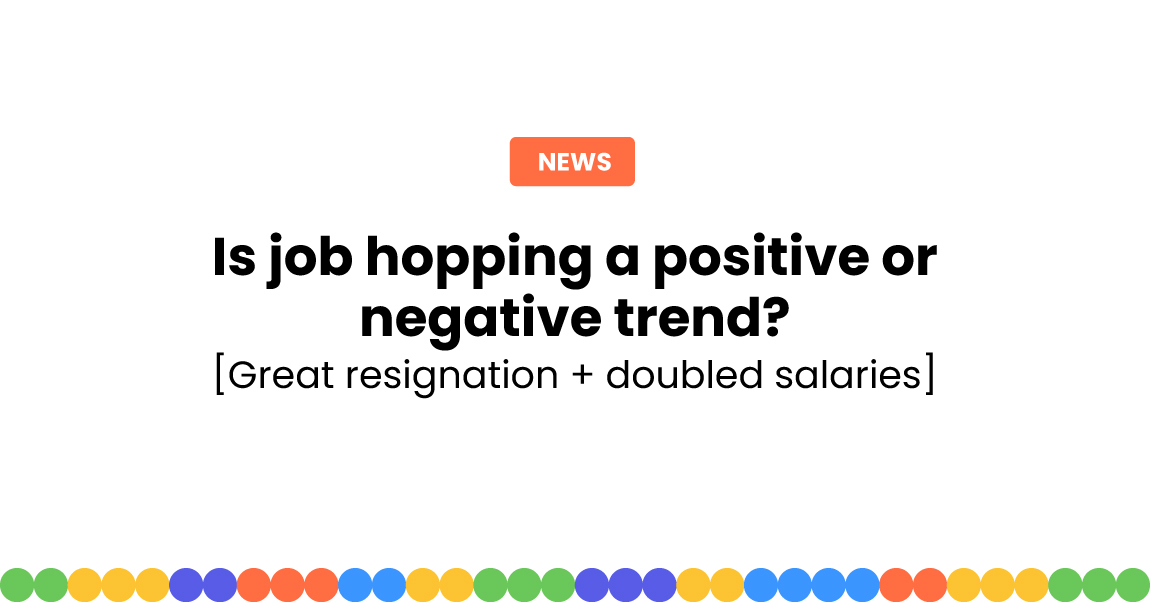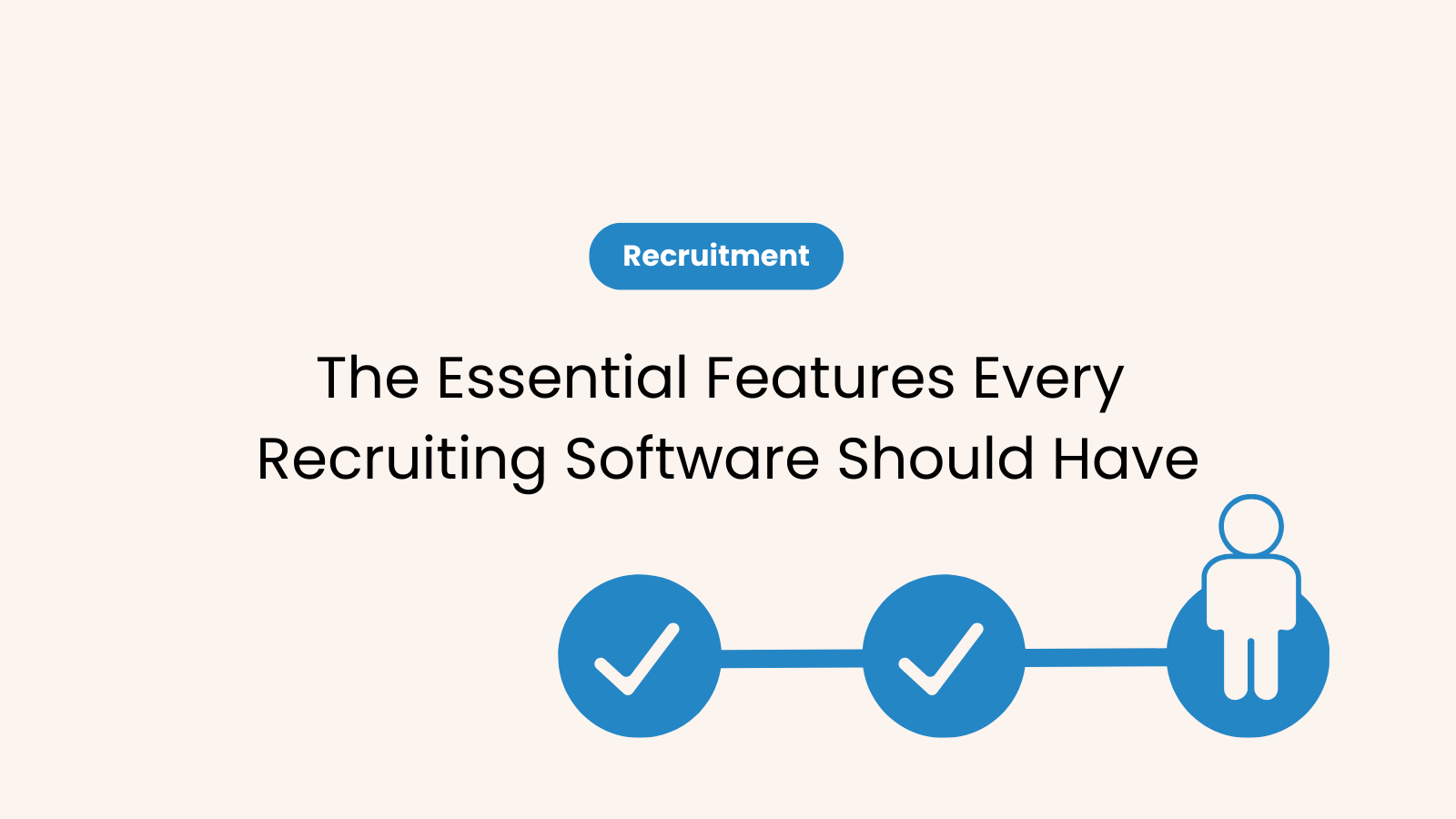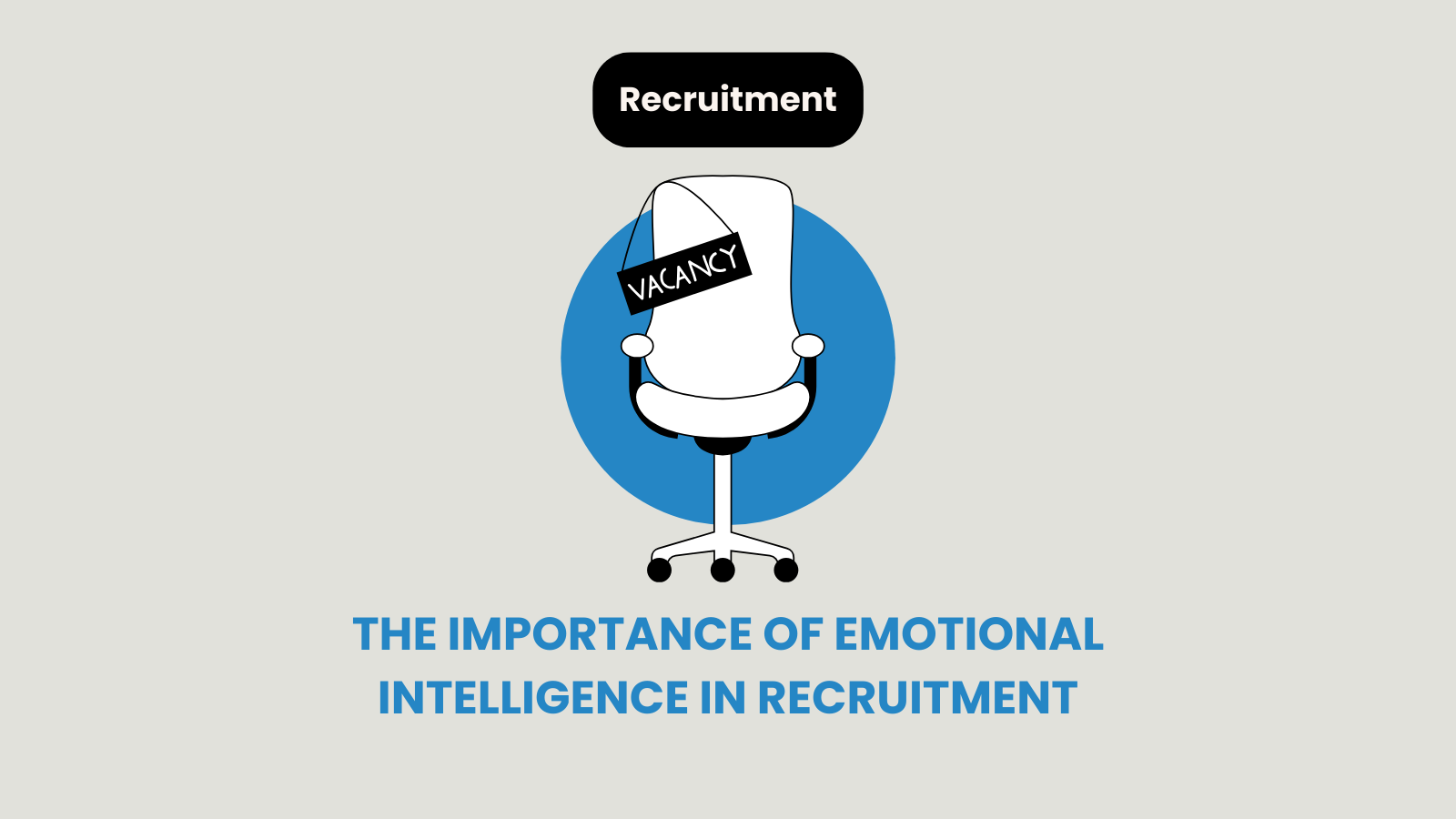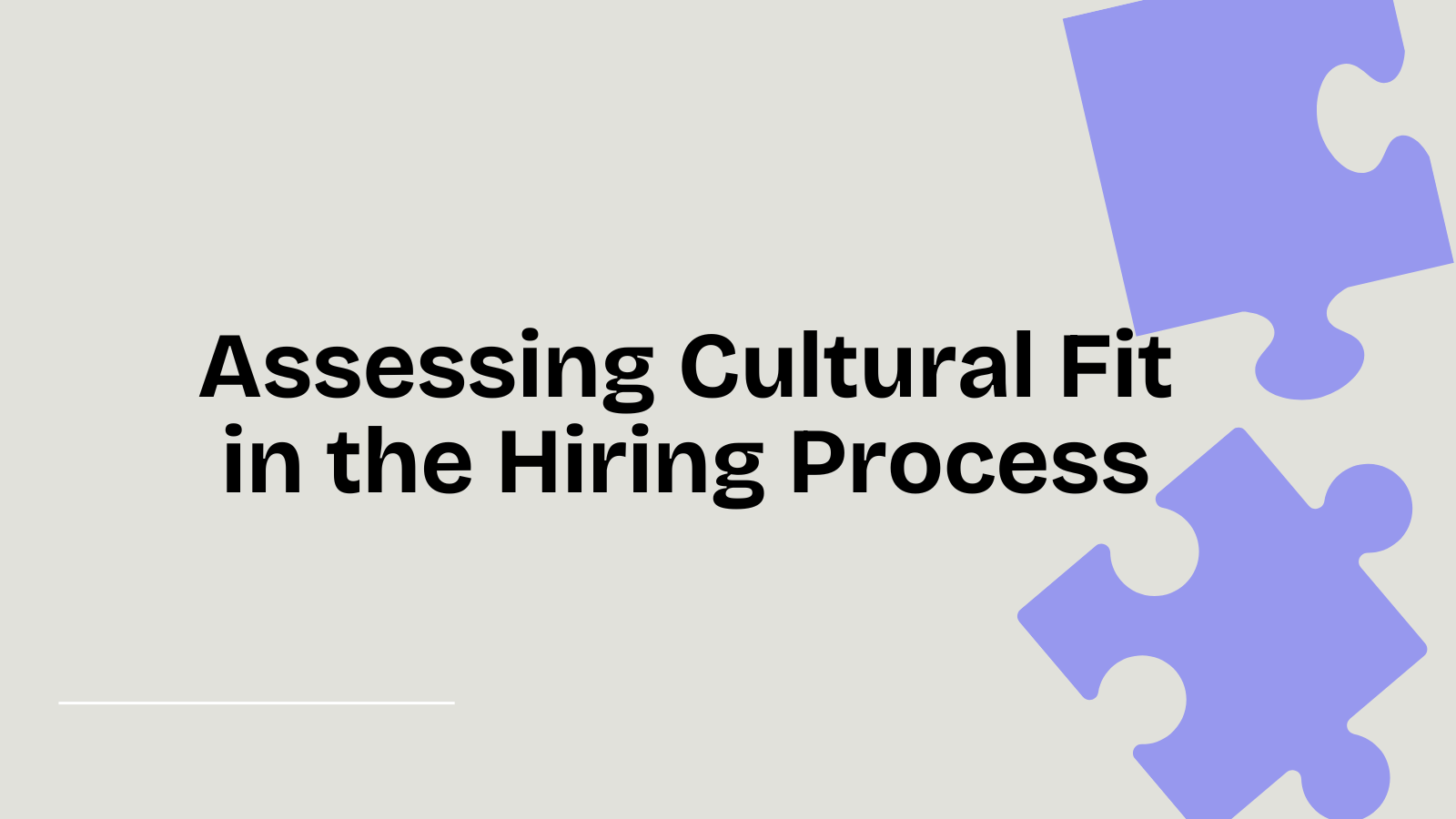To hop or not to hop? That is the question. And the answer is clear: job hopping is the new trend! And it’s reshaping the market. This fresh & turbulent tendency is mainly carried out by Gen Z employees and job seekers. Well, Millennials do play a part here, too.
But why is it so popular? And, more importantly, does it bring more advantages or disadvantages? Let’s get analytical!
What is considered job hopping?
Some people stick around with their companies for quite some time. Others, well… don’t. And those infamous individuals who choose to change jobs frequently are referred to as job hoppers. They scout out one position after another and voluntarily switch roles and firms every 0 to 2 years. Many of these people start eyeballing new career opportunities after only 3+ months with their employer.
While many recruiters and hiring managers consider job hopping to be a massive red flag, this trend is exponentially growing. Turns out – industry professionals did find a buzzworthy perk or two to bouncing from business to business.
Common reasons for job hopping
Being ‘poached’ by another company’s in-house hiring team or a recruitment agency can sometimes be reason enough for a person to hop between jobs. However, it’s not that simple. There are more than just a few whys that make employees leap toward a new employer:
❌ The lack of room for personal and professional development within the current company,
❌ Repetitive and boring assignments and unfulfilling duties,
❌ The absence of essential benefits + financial compensation.
Now, basic elements like a good salary and a well-crafted plan for each employee’s growth will definitely prevent many from skipping your firm and landing a brand-new position elsewhere. But still, it won’t do the trick for some. It’s because there are more reasons for job hopping that need mentioning. The main one is being unsure which career move would be the best. And, while searching for oneself & the perfect opportunity, many choose to hop and hop to collect skills and diverse experiences. And finally, there’s a certain category of people – those who quickly get bored.
Job hopping 2022: The massive generational shift
During the good ol’ days, it was believed that companies must reward loyalty with more money and ladder climbing. But now, the tables have turned. The major shift started during the 80s. It was back then when sticking around and making a devotion-fused utopia turned out to be no more than a castle in the sky. Massive layoffs (similar to the one that started in 2022) shattered the peachy-colored image of employees’ fidelity.
Now, fast-forward to the present day. According to the US Bureau of Labor Statistics, younger employees are the ones who tend to change jobs intermittently. Those who are younger than 34 are most likely to search, review, and hop. Workers aged 20 to 24 are inclined to stay with a company for an average of 1.3 years. So, while Millennials are embracing the trend, Gen Z candidates and employees are the ones who build it up.
The news of resignation + double raise
According to research, the number of people who changed their jobs was 37.6% higher this year than in 2021. And even though the world keeps on feeling (more) unstable, many jobs are still out there, waiting to be grabbed by skillful + courageous.
According to Fortune’s studies, US workers who started bouncing from one career path to another have been earning raises twice as big as those who chose to stay at their old jobs. In fact, those who went for the next opportunity in a different firm earned a median raise of 16%. And that almost doubled their median change in yearly compensation compared to those who delayed their resignation.
The ultimate question: Is job hopping a positive or negative trend?
We all know that the last few years were pretty turbulent. First, we had staggering articles about the great resignation and mass rage quitting that was spreading like wildfire. But just a few months later, that news was neutralized by the myth busters who claimed that this workplace phenomenon was greatly exaggerated. Unfortunately, the crisis then deepened. And the world has faced layoffs, making us question whether there’s such a thing as a recession-proof industry. Did these global changes affect the job market and compel people to hop from one company to another? The answer is obvious. These events have pushed talent further into job hopping.
But is it OK to hop from job to job? Let’s break it down into components.
Job hopping benefits
Have you heard of a story about a Gen Z employee who has landed three different jobs within a single year? Yes, it’s true – and this piece of news found a way to divide recruiters, HR professionals, and other hiring experts. Half of them have placed the blame upon the Zoomers. And the other half pointed their fingers toward businesses.
And who has a point here? Well, it seems like there is plenty of evidence to support the claims of those who accused the companies of driving this particular youngster (+ many others) to seek a better career opportunity elsewhere.
Job hopping = Getting paid more
A substantial increase in salary doesn’t sound too shabby, right? Well, the word on the streets is that job hoppers usually manage to get higher pay – and quickly. Here’s a thing, many well-established companies choose to stick with fixed salary ranges. And many of them move gradually (in other words – very slowly) when offering some extra money to their workers.
So, many employees will go on a job hunt and get in touch with recruiters and hiring managers to obtain an adequate wage. They’ll go through salary negotiations and eventually reach the financial range that suits them.
Bouncing from one company to another means an improved set of skills
Collecting a wide range of essential skills & some useful experiences is on (nearly) everyone’s agenda. And, well, cruising through different companies and sectors often does the trick. In fact, if you’ve only stuck with a single career for a very long time, you’ll get caught in a whirl rather than advancing. So, amplifying one’s knowledge is at the very top of the reasons for job hopping, making it a positive trend for workers. And, simultaneously, it makes it favorable for employers too. A more qualified, skilled, and eager workforce awaits.
One of the main skills a person will adopt or boost is adaptability. Stepping into a brand-new and entirely different work environment every once in a while enhances one’s capability to acclimatize + thrive.
Switching jobs guarantees a vaster network
Building a wider network is obviously a clever move. And while talking to the same group of colleagues and clients does have a certain appeal (and does bring some perks), mixing things up and getting to know more professionals is a better way to advance one’s career. So, hopping to a new firm can help create strong relationships with multiple new teammates. But also, it’s vital to end the old job on good terms. Because that’s how people manage to open various doors and forge ahead.
Job hopping disadvantages
How to explain job hopping properly without stating some crucial pros and cons? We’ve seen that this phenomenon does indeed bring some amazing benefits for employees who embrace it. And, it also drives some positive effects for the companies. Still, there are some downsides to it.
Starting over from scratch & proving loyalty
Proving one’s worth all over again can be exhausting. First, a candidate must boost their resume – once again. Then, they’ll be persuading recruiters and interviewers that they have what it takes to join their squad and bring some extra skills to the table. And finally, they’re in. But now, the people they collaborate with on a daily basis also need to get to know them and trust them.
And here’s another setback a person could face if they jumped from firm to firm – some leaders and managers might be monitoring them more closely. So if one’s (a bit too) colorful experience raises a red flag, you better believe that they’ll have to look over your shoulder.
Failing to spot some values
Those who see each new career move as brief and ephemeral sometimes fail to spot the amazing perks certain teams and businesses bring. In other words, many job hoppers just don’t pay enough attention to the company they’ve entered and overlook its values. So, at the same time, they miss the tremendous value they bring to the business too. And that could lead toward an even more dangerous territory – not feeling any satisfaction toward one’s career.
That’s a part of the toll job hopping could take on someone’s mental health. Another all too real symptom to beware of is new job anxiety. No matter how prepared, going through all those adjustments (frequently) is extremely stressful.
Is job hopping bad? Well…
Yes, job hopping still has a bad rep – at least if you ask a recruiter or an HR expert. Still, there are two sides to every hiring trend. And so skipping one company and bouncing straight to the new one brings some noteworthy benefits, starting with a significant money gain (from an employee’s perspective). On the other hand, certain drawbacks are also entailed. For instance, one who’s known to hop from firm to firm sometimes gets blacklisted.
But there are some tested tips for workers who strive to get a raise by changing their jobs:
- Get ready for an interview so that you can justify your career moves and choices,
- Shift the focus on the relevant skills you have acquired in the process,
- Keep the potentially bad experiences from the previous company hidden (or at least be objective and not resentful about it),
- Be confident about the contributions you’ve made to each business you worked with.
As for the employers, here’s the ultimate piece of advice to follow – hire a competent and trustworthy recruitment agency. That way, you can filter all candidates and go for a knowledgeable and reliable one. Even if their resume says that they’re prone to frequent changes.




